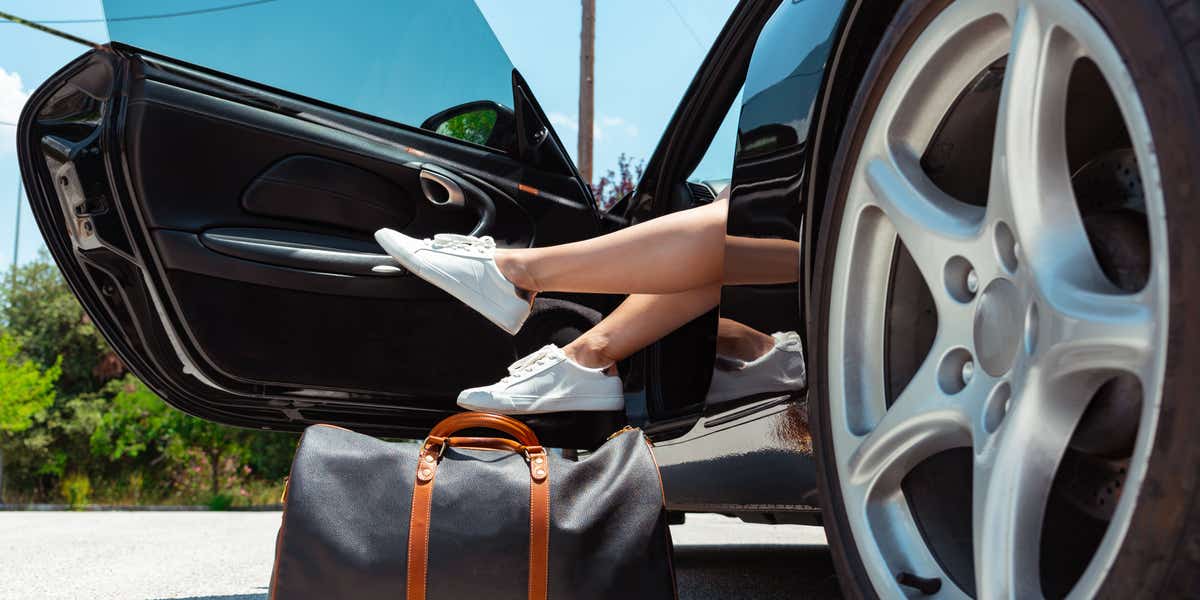- Uswitch.com>
- Car insurance>
- Guides>
- Driving abroad - what you need to know | Uswitch

We explain what documents you need, and customs to be aware of when you drive in Europe and worldwide.
What documents do I need to drive abroad?
First and foremost, you must take your full driving licence, as driving abroad on a provisional licence is not allowed. You’ll need to take your log book (V5C) and your car insurance certificate as well – but more on that later.
Coronavirus and going abroad
Coronavirus is likely to be an issue wherever you travel. In many countries you’ll be obliged to provide proof that you and your passengers, of a certain age, have been vaccinated or have a valid exemption.
Given the requirements are subject to change at short notice, it’s best to check on the government’s foreign travel advice website for the latest in the country or countries you are visiting.
Documents required for driving in Europe
Your photo driving licence will suffice in EU countries as well as Iceland, Liechtenstein, Norway and Switzerland. But you may also need an international driving permit if you venture further, or if you only have a paper driving licence or one issued in the Channel Islands, Gibraltar or the Isle of Man. If in doubt check with the relevant foreign embassy.
Documents required for driving outside Europe
You’ll need an International Driving Permit (IDP) to drive in countries outside of the EU.
if you’re travelling through more than one country, you might need more than one type of IDP, of which there are three – 1926,1949 and 1968
if you’re hiring a car, check with your car hire company
if the country you’re visiting is not included in the Gov.uk list, check with the embassy of the country you’re travelling to
Where can I get an International Driving Permit and how much does it cost?
You can get an International Driving Permit from the Post Office, the AA or the RAC, at a cost of £5.50.
you must be over 18 years of age, with a full licence and be a resident of Great Britain or Northern Ireland
a 1926 or 1949 IDP lasts for 12 months
a 1968 permit lasts for 3 years or until your UK driving licence expires, whichever comes first
What else do I need to take when driving abroad?
There’s more to driving abroad than sticking to the other side of the road. Depending on where you're going, you could be obliged to travel with all manner of driving kit.
For example, the French require all drivers and their passengers to have high visibility jackets close to hand, as opposed to being packed away under a tonne of luggage in the boot. In Spain, Cyprus and Malta a GB sticker is a must, even if you have one on your number plate.
Each country will have its own list of requirements, which are subject to change, so it’s best to do a search before heading off and ensuring you have the right equipment.
To be on the safe side, pack the following, in addition to fitting a GB sticker to your boot and taking reflective jackets:
a red warning triangle
headlight convertors
a first aid kit
spare car lamp bulbs
emission certificates (for certain cities – see environmentalbadge.com for more info)
Driving abroad and local driving customs
Each country has its own regulations that will be second nature to native motorists but might catch British holidaymakers out.
For example:
you must park on a certain side of the street in some parts of Spain depending on the day of the week
anyone driving in Romania or Russia can get a fine if caught driving a dirty car
Other customs that might result in a fine or worse include:
Driving in Germany – it’s illegal to overtake school buses that have their hazard lights on
Driving in Holland – buses have right of way when leaving a stop in built-up areas
Driving in Macedonia – passengers who are visibly under the influence of alcohol can’t travel up front
Driving in Portugal – it’s illegal to carry bikes on the back of a car
Driving in Slovakia – proof of medical insurance is a requirement when entering the country
Driving in Spain – drivers who wear glasses, and this is noted on their licence, should keep a spare pair with them
Police in most European countries are able to give on-the-spot fines or confiscate your car if you infringe their driving laws and fail to pay up, so it pays to be aware of local laws.
Child safety and alcohol limits
Different countries have their own rules on how to ensure children travel safely — so before you leave check what individual country requirements are.
Alcohol rules tend to be stricter for driving abroad than they are here. The UK limit for drivers is 80mg of alcohol per 100ml of blood (50mg in Scotland), while it’s often 50mg per 100ml or lower in the EU.
Remember to make sure you have the appropriate car seat if you have passengers who are young children.
What car insurance do I need to drive abroad?
If you're looking for car insurance, bear in mind your UK policy may protect you when driving abroad in the EU, the EEC and other European countries such as Switzerland, but this may only be third-party only cover. For this reason, it’s essential to check your policy before travelling to ensure you have a level of cover you’re comfortable with.
If you’re not, contact your policy provider as many insurers will extend comprehensive cover to Europe for limited periods.
If you want more comprehensive European car insurance with extras, such as for an extended period of travel overseas, speak to your provider about an upgrade.
How old do you need to be to drive abroad?
Even if you have a full licence, your insurer may stipulate a minimum age and driving experience before they will consider you insured. This can be 18 or 21 years old, so check your policy. You will usually need to have held a full driving licence for at least six months.
Do I need a green card to drive abroad?
Some countries insist foreign drivers carry a ‘green card’ – a form of ID you can get free from your insurer, and is required as proof that you’re insured.
Countries where you are required to have a Green Card, include: Albania, Belarus, Bosnia and Herzegovina, Iran, Israel, Macedonia, Moldova, Montenegro, Morocco, Russia, Tunisia, Turkey, and Ukraine.
Breakdown cover for driving abroad
Breakdown cover is one of the most popular, even essential, policy elements to have if you’re planning to drive abroad. This type of policy, which can be bought as a standalone solution, can also include accommodation costs and perhaps a courtesy car. Both benefits are handy if your car needs to spend several days in a garage being repaired.
Breakdown cover can also pay for the cost of bringing your car back from another country if you are unable to do so. This could be the case if your car needs extensive repairs, or if you’re injured and unable to drive.
Note that some insurance policies include European breakdown cover as standard – so check your car insurance policy.
Hiring a car abroad
Hiring a car is another great way to explore a new country. But it’s not as easy as walking into a car hire company and being handed the keys — you need to do some preparation first, which will include:
proving you’re entitled to drive, so must bring your driving licence with you
declaring any endorsements on your licence
ensuring the cost of hire will include insurance
considering whether you want to take out excess insurance to pay off the excess if you do have an accident
Driving abroad if you have endorsements
The paper driving licence counterpart was abolished on 8 June 2015, since then this information has been stored electronically by the DVLA.
if the car hire company requires this information, you can give them online access by using the DVLA’s Share Driving Licence service
the service allows you to generate a code
the hire car company uses this code to view relevant parts of your driving licence
for security reasons, the code is only valid for 21 days
you can generate the code before you go away but if you're on an extended trip you may have to log on or call the DVLA while you’re abroad
Some hire companies may accept print-outs of this information.
How to save on car insurance when driving abroad
There are several ways to save on car insurance when driving abroad, including:
Being a named driver
If you're borrowing a car for a trip abroad or you want to share the driving on a trip with friends or family, you can ask the car's owner to add you as a named driver on their insurance policy.
The policyholder will need to inform their insurer that their car will be driven abroad by the named driver.
This may not be the best or cheapest option if you only plan to drive another car on a one-off basis.
‘Driving other cars’ cover
You may already be insured to drive their car if you have ‘driving other cars’ cover on your own vehicle.
Check the restrictions — as this type of cover is usually only third party and may exclude driving outside of the UK.
Temporary car insurance
If you are only planning on borrowing a car you can also compare quotes for short-term or temporary car insurance.
Temporary car insurance is often the best option when sharing or borrowing a car to drive abroad.
this can usually cover you to drive someone else's car for up to a month, but check as some are limited to 28 days
some policies offer the choice of cover within the EU
the car must be UK-based with valid road tax and MOT
Your checklist for driving abroad
The RAC recommends the following equipment when driving abroad.
Red warning triangle
High visibility jacket
A first aid kit
Headlight converters
GB sticker

